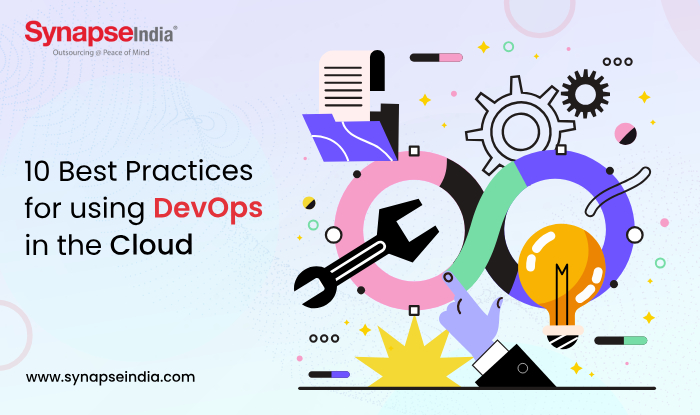 04 May 2024
04 May 2024“Implementing DevOps in the cloud requires a strategic approach that leverages automation, infrastructure as code (IaC), and continuous integration and continuous deployment (CI/CD) pipelines.”

The technology of cloud computing with DevOps methodologies has grown progressively indispensable for enterprises aiming to attain efficiency, scalability, and agility in their software development and deployment procedures. When combined with the flexibility and scalability of cloud infrastructure, DevOps—a collaborative approach that emphasizes communication, integration, and automation between software development and IT operations teams—offers organizations previously unheard-of opportunities to improve overall business performance, streamline development workflows, and accelerate time-to-market. We'll look at how to use DevOps in the cloud to accelerate digital transformation in your company and optimize the advantages of both paradigms in this blog post.
Let’s know each of the technologies mentioned in the context of using DevOps in the cloud:
IaC is the process of controlling and allocating resources for infrastructure using machine-readable definition files (like YAML or JSON) as opposed to interactive configuration tools or manual procedures. This method ensures consistency, reproducibility, and scalability in cloud environments by automating infrastructure provisioning, setup, and management.
Software development life cycle (SDLC) processes and tools are automated by Continuous Integration/Continuous Delivery (CI/CD). Code updates are merged into a common repository as part of continuous integration, and automated tests are run to find integration problems early on. Software updates may be distributed quickly and reliably thanks to continuous deployment, which automates the release of code changes into production settings.
Applications built using the microservices architectural style are made up of discrete, autonomous services that connect using clear APIs. Every service can be independently built, deployed, and scaled, and each one is in charge of a certain business function. Microservices facilitate quicker time-to-market and simpler maintenance in cloud-native environments by fostering agility, scalability, and resilience.
Scalability is the capacity to increase resources—like computing instances or storage capacity—to meet demand to handle growing workloads. In dynamic cloud systems, elasticity ensures optimal performance and cost-efficiency by automatically modifying resources depending on workload fluctuations, extending scalability.
To find and fix security flaws and compliance problems early in the software development lifecycle, security automation entails incorporating security controls and procedures into the DevOps pipeline. To reduce the possibility of security breaches and guarantee that cloud-based infrastructure and applications are secure, automated security testing, scanning, and policy enforcement are used.
Solutions for logging and monitoring give users insight into the security, availability, and performance of cloud-based infrastructure and apps. While logging solutions gather and examine the logs produced by systems and applications, monitoring tools gather metrics and telemetry data. When combined, these technologies allow for proactive monitoring, troubleshooting, and optimization, which guarantees cloud deployments' dependability and strength.
Immutable infrastructure refers to an architectural paradigm in which new instances of infrastructure components—like virtual machines or containers—are always substituted for existing ones whenever necessary. This method makes it simpler to manage and maintain cloud infrastructure at scale by removing configuration drift and guaranteeing consistency across environments.
DevOps places a strong emphasis on sharing accountability, working together, and communicating with operations, development, and other parties engaged in the software delivery process. A DevOps culture encourages accountability, openness, and trust, which helps teams collaborate more successfully and provide value to clients more quickly.
Using tactics and steps to optimize cloud usage and increase return on investment (ROI) is known as cloud cost management. Cost-controlling strategies include resource tagging, rightsizing, and automated shutdown procedures. Cloud cost management solutions give businesses visibility into consumption and expenses, empowering them to allocate resources and create budgets sensibly.
Important elements of cloud architecture that guarantee data integrity and business continuity in the event of hardware malfunctions, natural catastrophes, or other disturbances are disaster recovery (DR) and high availability (HA). Whereas HA designs use redundancy and failover techniques to reduce downtime and guarantee service availability, disaster recovery (DR) strategies replicate workloads and data to remote locations for backup and recovery purposes.
Organizations can create the potential of DevOps in the cloud to boost innovation, increase agility, and propel digital transformation by utilizing these tools and best practices.
Scalability and flexibility are enhanced by DevOps approaches, which make use of cloud resources to enable on-demand infrastructure expansion and provisioning. By combining automated testing, monitoring, and disaster recovery planning, this method improves resilience and reliability while guaranteeing high availability and uptime for cloud-based services. DevOps approaches also help businesses optimize their costs by managing cloud costs and optimizing their infrastructure, which helps them get the most return on investment. Last but not least, DevOps promotes a culture of experimentation and creativity by utilizing cloud platforms to quickly iterate and continuously improve software solutions. To put it briefly, DevOps methods enable businesses to address changing business demands and expedite digital transformation, which is crucial for success and competitiveness in cloud-based environments.


